Resum en valencià
VOYAGE OF DREAMS
30 june 1936 – 15 august 1936
Letters
from Carmen LAGOS BESTEIRO to her parents
Spain and France, Summer 1936
“Today we
had so much fun!” -
Carmen LAGOS
BESTEIRO, Spain, 18 July 1936
Translated into English by Emil Signes, 2005
Among the relatives in Madrid were more
grandchildren and great-grandchildren of my great-great-grandfather
Salvador
LAGOS ZAPATA
(who would have been paternal 1st cousins once removed or 2nd
cousins of Carmen, respectively). Among the
maternal relatives were
granduncle and grandaunt Julián and Carmen BESTEIRO
FERNÁNDEZ, and Beatriz LÓPEZ-OCAÑA
BESTEIRO, first cousin and good friend of my grandmother, and her
daughter Beatriz
LÓPEZ-OCAÑA LÓPEZ-OCAÑA, my mother's second
cousin.
There were also relatives of my grandfather in
his hometown of Periana, Málaga, but I don't know if they were
planning to travel there.
The following is my transcription of letters
written by my mother to her parents, sometimes with a brief comment by
my father, from their arrival in France on the German ship Bremen on
the 6th of July until they arrived in Paris on the 6th of August after
a dangerous and frightening exit from a Spain in a state of full Civil
War.
They never got to Madrid, nor would they be
able to return to Spain until July 1965, following my wedding in
Germany.
I hope that this will be of interest not only
for familial matters, but also for being a personal perspective on the
first few days of the Spanish Civil War in a small Valencian
town, and later Valencia. How ironic that the first thing my
mother wrote on July 18,
the first day of the War, was "Today we had so much fun!"
Extracts
It's hard to believe that we had such a
wonderful crossing. We didn't miss one single meal, not one
evening of dancing, not one moment of fun. May God be willing for
our return to be as joyful.
-- Cherbourg, July 6,
1936
Here there are very curious customs:- When you
pass someone on the street, they say "Adios." There are some that,
instead of "Adios," say "Salud," and Papá [Emilio's father] says
that they are the communists. -- Gata de Gorgos, June 17, 1936
Today we had so much fun!
-- Gata de Gorgos,
July 18, 1936
Don't worry about us, because here everything
is as calm as a millpond. -- Gata de Gorgos, July 21, 1936
Speaking of the Holy Ghost, Spain is in need
of His blessing! Yesterday in Gata they wanted to burn the
church, but in the end they decided to leave the church so that they
could use it themselves, but to burn all the saints. I think that
very early they took out all the religious images and set them on fire
- WITH THE CONSENT OF THE AUTHORITIES. I don't know how they can
have hearts so hard. More than half of Gata spent the day crying.
--
Javea, July 25, 1936
We're out of Spain! - Toulouse, August 2, 1936
We didn't say goodbye to anyone . . . , but I
think everyone knew that it was our farewell, except for Papá,
and he almost knew it but he didn't want it to be. The poor man
cried and said, "Tell the consul that in Gata you are fine, and then
send a cable to your Papá and Mamá and come back.
Carmencita has to eat a lot of ripe grapes and I want her to see
["escaldar
la pasa" - part of a very old process in the making of raisins].
You'll be back, won't you?" It was sad.
The train arrived in Valencia at 9 in the
morning and we found a Valencia that was completely paralyzed - the
shops all closed, taxis, buses, trolleys - none of them were working.
We arrived at the government offices and they
told us that in order to leave Valencia we would need to get a
safe-conduct pass, but no one thought they would let Emilio leave.
The station was filled with indescribable
excitement. Those that had gathered in front of the train shouted
with enthusiasm. “¡Long
Live
the Republic!” shouted one, and together, making a deafening roar,
everyone answered
“¡Viva!”
“¡Long Live the Communist Party!”
“¡Viva!”
“¡Long Live
the Anarchist Federation!"
“¡Viva!”
“¡Death to Fascism!”
“¡Death!”
¡It
really angered me that I had been in Spain and hadn't got to see a
single one of our uncles, aunts or cousins! - Paris,
August 3, 1936
D. “Bremen” 6 July [1936]
6 menos 10
1 “ 10 (de N.Y.)
Norddeutscher Lloyd
Bremen
Since last night there's been a terrible fog. I think we were
stopped for quite a while because they didn't dare keep going.
It's hard to believe that we had
such a wonderful crossing. We didn't miss one single meal, not
one
evening of dancing, not one moment of fun. May God be willing for
our
return to be as joyful. Well, they're coming to get us off, so,
ADIOS.
A thousand kisses and hugs from your children
Carmita and Emilio
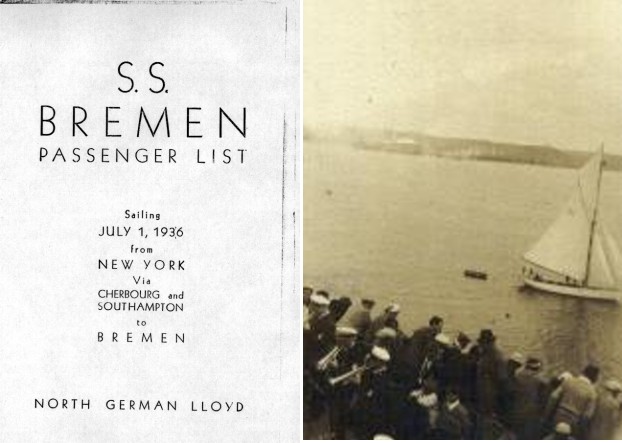
Hotel
Peninsular
Barcelona
It's 8:15 AM and I've already heard mass in 2
different churches and I'm back and writing you in the hotel. We
already have much to tell you.
The Bremen arrived at Cherbourg on the 6th at
6 AM; we got up at 5, and 5:30 we had breakfast; but though we were
very close to the port, the Bremen couldn't get all the way to the dock
because of a huge fog. For that reason they took us in a little
boat.
The new dock at Cherbourg is truly a jewel;
everything is extremely clean and very well organized. The
customs agents behaved very well; they hardly looked at anything.
Around 11:30 we took the train for Paris, and
then we began to see how tiring it is to travel by train. We were on
the train for five and a half hours - with a great desire to get to the
end! But in the end this leg was short compared
to the one we had to make on the next day.
We got to Paris around 6 and there we found a representative of "North
German Lloyd" who very courteously offered us his services.
When we told him we thought we'd like to spend the night in Paris he
said that he himself would take us to a hotel. We asked him if it
would be possible to change the ticket we had so that instead of taking
us to Vigo we could go to Barcelona and he immediately said yes, that
he would take care of changing the ticket for us and check the
luggage there. We then got into a bus from North German
Lloyd and they took us to the Hotel Fournet. The hotel wasn't
pretty at all but it was very clean and we got a room with a
bath. Needless to say we immediately got into the bath to get rid
of the coal dust which covered us from head to feet; and from bath to
bed.
[Written
in the margin]:
Mommy, please do me the favor of saving me these letters, because I
don't have the time to write any other impressions of the trip, and I'd
like to write them later on.
In the morning we had breakfast in the same
hotel and went for just a short walk, as we had arranged to go on a bus
excursion at 10:30. At 10:15 a taxi came to get us at the hotel
and from there they took us to the office of the excursion
company. There we got on a bus and began an excursion that will
always remain engraved in my mind. It is impossible to describe
the emotion on seeing so many things in person that I had only seen in
the
movies. At times I thought, "No, I'm not really here.
Soon the alarm clock will ring and I'll roll over saying, 'Ay, Emilio -
what a dream I've had!'" But no, thanks be to God, it wasn't a
dream. The guide on the bus spoke I don't know how many languages
perfectly.
Carmen on the Champs
Elysees
The interior of the church is very simple and
that alone is greatly impressive. The main altar represents Mary
Magdalene carried to heaven by three beautiful angels. It was
when the guide was explaining some details of this altar that we heard
a very refined voice ask in French "Can you please explain that in
Spanish?"
We looked, and we saw that the voice belonged
to a middle-aged lady dressed in that simple elegance that is the sign
of true aristocracy, and as we left the church we spoke to her.
"Are you Spanish?" we asked.
"Yes," she answered us with eyes
illuminated by having encountered compatriots in a foreign land, "are
you as well?"
From then on we were inseparable during the
rest of the excursion. She told us that she was called "Candida
del Fresno," that she is Asturian but when she is not traveling
(which she does quite frequently), she lives either in Madrid or in
Alicante. She has been a week in Paris, but on Friday she left to
take a trip through Germany, Switzerland, and Scandinavia. She
gave us her address in Madrid, Calle Montesquinza No. 6, and her
telephone number, but we won't be able to see her, because she won't be
back until October. She is a very nice woman and must be well
situated, not only because she travels, but also because she doesn't
like either the socialists or any other parties of the left. At
the end of the excursion she said goodbye very affectionately; she gave
me a kiss and promised to come see us when she comes to New York.
Well, I was telling you what we saw in Paris:
- The Place de l"Etoile with its Arc de Triomphe, below which the
Unknown Soldier was buried, also tugs at one's heart. But the
thing that impressed me the most, the thing which I will never forget
is Napoleon's tomb. It's a situation completely opposite to that
of the Madeleine. This building was built as a church, so it
could become the Royal Chapel, and once it was built, they excavated
the center and there they made Napoleon's tomb. His remains rest
in a huge granite sarcophagus, surrounded by statues that represent his
various victories, and flags that he used in his battles, faded by
time. The sarcophagus is sunk into the floor, and next to the tomb are
engraved in marble these words of Napoleon: "I want my ashes to rest
next to the river Seine, in the center of the French nation which I
have loved so much." In the vicinity are tombs of Napoleon's
relatives and generals; among those that of "Pepe Botella" [the
Spaniards' nickname for Joseph Bonaparte] and of Jerome
Napoleon. The tomb of this last-named person has a sad
story. Next to his sarcophagus is a very tiny sarcophagus.
In it is the heart of his wife, Catherine of Württemberg.
They say
that she loved her husband very much but knew that when she died she
would be buried in the pantheon of her own family, so she
asked that when she died at least her heart be buried next to her
husband.
Well I'm out of paper and I could still write
"ad infinitum."
At 8 in the
evening the agent from the steamship company came to find us at the
hotel and took us in a taxi to the train station. There we took a
train at 10:05 - and - regarding the trip, the less I write the
better. How tiring! We arrived at Port Bou at 1:30 (French
time, in Spain, as they don't change the clock, 12:30). There
they reviewed our passports, checked our luggage very courteously
and we left customs without having to pay a penny. The train for
Barcelona left at 2:40, so we had a very good and abundant meal in the
station restaurant. We left at 2:40 and arrived in Barcelona at
6:10. You can't say these Catalans aren't good businessmen!
In
the station there were representatives of the Hotel Roma and the Hotel
Comercio, and both wanted to take us to their respective hotels, but we
told them that we already had a hotel, and we headed to the travel
agent of Marsans, which is the company that represents American Express
and he recommended the Hotel España as a good but not too
expensive hotel. When we arrived they didn't have a room with a
bath (the steamship Buenos Aires had arrived and therefore there were
many tourists here), but they recommended the Hotel Peninsular, which
they said was of the same category. So here we are, on calle San
Pablo. . . a street that appears part of some oriental country -
because of its narrowness.
We have a balcony which stretches from floor to ceiling and it has green
shutters. The curtain is beautiful, made of
Richelieu lace and mesh, with a very pretty fringe. Our room is as large as the living
room and dining room of your house. Imagine, it has a gilded bed
that shines like the sun, with a nightstand on each
side; next
to the window, a table in case you would like to eat in the room, and
two chairs, one on each side, and in addition a sofa, 3 armchairs and an armoire,
and
despite so much furniture there is still room to dance (and I'm not
exaggerating). The bathroom is also very beautiful. The
entrance to the hotel isn't pretty at all, but after entering, one is
amazed that there can be that much beauty within such an ugly
facade. The entire interior is bathed in light which enters
through the roof of the building, which is all glass. In the center is a lounge,
which if it were in the open one would call a patio or garden,
and
when looking up, you see corridors surrounded by white iron railings -
these are all corridors built around the lounge. When you come to Barcelona you have to
stop here, in room 44.
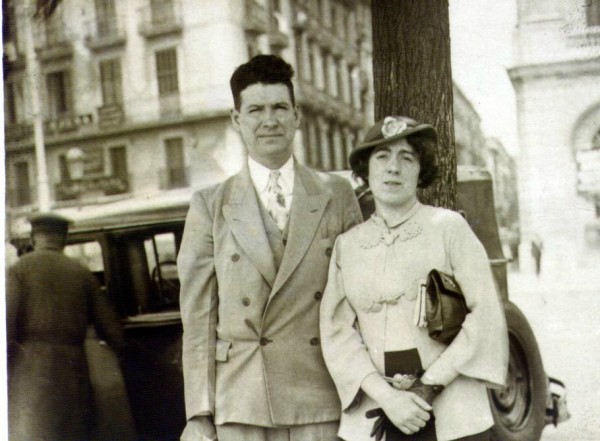
Carmen
and Emilio in Barcelona, 9 July
I almost forgot the most
important news! Last night we called Pepe, Emilio's brother, at the
barracks of the Guardia Civil. He was so surprised! He says
that
Pepet was there, and when he called him to the telephone he said "This
is Uncle Emilio," but he laughed thinking that it really wasn't so.
Valencia
10
July 1936
We arrived last night and this afternoon we
left for Gata, so we only have time to send you a lot of affection.
Your children,
Carmita and Emilio
Bill from the Hotel
Victoria, Valencia
Dearest Dad, Mom, Manny, Vicky, Dee, Charlie,
Jo, Lobina, Champy and Valencia,
[Lobina = the family dog (German shepherd); Champy = the family cat,
Valencia = the Signes car.]
We have arrived in Gata! The night before last
we arrived in
Valencia around 11 at night. We went to the Hotel Victoria on the
recommendation of a lady who was with us on the train, but we regretted
it, because it was an extremely expensive hotel. We spent the night
there, and the next day we went out into the city. After we had
walked around a while, we went to the station to find out what time the
trains left for Denia, and there we met an very entertaining
gentleman. We went to the office to which we had been directed,
and there we saw a heavy man, half bald, with a wide mustache.
He had his jacket on, but his collar
off. We went to him and the first thing he said to us, speaking
very fast and expressively, was "Please excuse the fact that I'm like
this, but this heat is brutal, there should be a law prohibiting work
in the summer. In the
winter work is a delight, a protection against the cold, but now!"
After that, when he was speaking of the street
where a certain hotel in Denia was located, he said: "It is in the
street of the Marquis ------; well actually, that's what they used to
call it; now they'll call it the street of the President of the
Republic or somebody or other, . . . but that's that. At any rate
you can pass the night there,
with permission of the mosquitoes.
A little later he offered Emilio a cigarette,
and when Emilio told him that he didn't smoke, he answered him "Well,
that's your loss. Vices are a delight; I'm sorry for the ones I
don't have." Later, when we told him that we found Valencia a pretty
city, he answered "It's all right. If one can't live in the best
city in
the world, it's all right."
"And in your opinion, what is the best city in
the world?" we asked him.
"Come on!" he answered, "do you have to ask
that? What city can it be, besides Madrid! Madrid has the
characteristic that you can have a good time there even without money!"
But I really didn't think I was going to
dedicate this letter to a gentleman whose name we don't even know.
Yesterday we left Valencia at 6:40 and arrived
in Denia around 9:30. We were a bit worried because we didn't
know what arrangements we could make to reach Gata, but we were lucky,
because a gentleman on the train had a taxi awaiting him and he
arranged for us to be brought here. We arrived around
10:30. It is impossible to describe the happiness that we brought
to this house. Emilio's father and mother immediately asked about
you and we gave them your regards, as you sent them. After
greeting the entire family and chatting awhile, we went to bed and
didn't get up until 11 in the morning. We had breakfast, and we
went to a little house outside the town called "El Pou de Pedreguer."
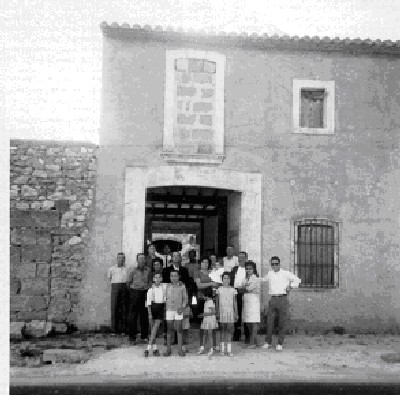
El
Pou de Pedreguer in 1964. It probably looked about the same in
1936.
This is the same building, now "Bar al Pou", in 2007
Antonio (son of Emilio's brother Antonio),
2nd child from the left in the 1964 picture,
is the propietor (above right)
There we passed a good deal
of time beneath a very high fig tree, with the little son of Anita,
Pepet. He is so nice! Antonio brought your letters here,
and when I mentioned that there was also a letter from Piti, Pepet
said,
"I know, she is the one on the end of the photograph." We finally
figured out that he has memorized all your names and where you are on
the photograph.
Carmen and Emilio's wedding photograph memorized by Pepet, the son of
Anita:
Carlos, Manuel &
Antonio Lagos, Emilio y Carmen, Pepita Besteiro, Victorina, Dolores and
Jo [Piti] Lagos
Well, I'm going to finish because it's 7:50
and at 8 the last mail leaves.
Believe it or not, but we already feel like
returning to see you. Receive a thousand kisses and hugs from
your children who at all times are thinking of you.
Carmita and Emilio
[Emilio's writing]: We arrived last
night. Imagine how happy everyone is.
My parents like the sweaters very much. A
great big hug from your son. Emilio
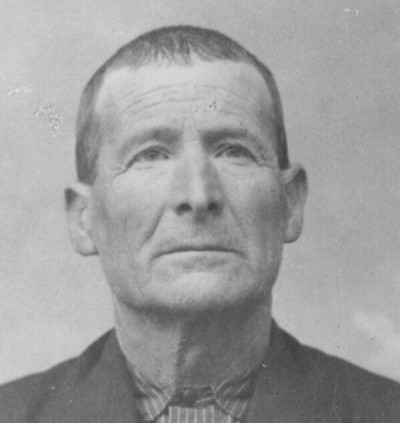
José
Signes García, Emilio's father
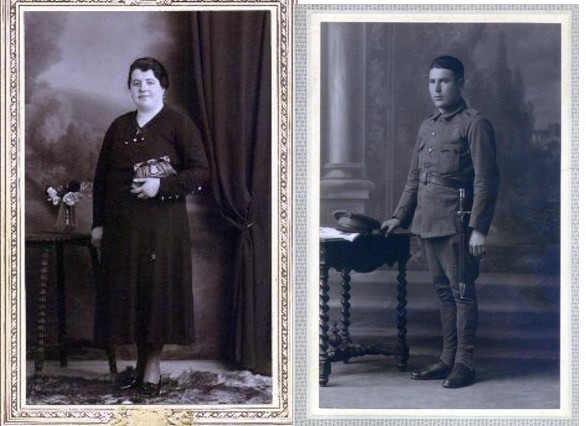
17 July 1936
Forgive the fact that so many days have passed
without writing. The truth is there's no time for anything.
Besides, in our bedroom there's no electric light, and below there is
always family and it is not so easy to write.
We are now passing the time having a lot of fun, although tell you the truth the first two days, both of us wished we could return earlier than planned, because it was a continuous hassle. At all hours groups of people were coming and putting themselves in front of Emilio: "Che! Don't you know me?"
Gata
de Gorgos c. 1918, near the house of Emilio's father
Here there are very curious customs:- When you pass someone on the street, they say "Adios." There are some that, instead of "Adios," say "Salud," and Papá says that they are the communists.
Something's about to take place in Gata that made us laugh because it was
identical to an incident that Papá [Lagos] recounts took place
in Periana. It seems as though a group of men from another town
came and wanted to rent Papá's countryside chalet to have a
"night club."
Papá said no, that this year he needed the chalet, and that
anyway, he
wouldn't rent it for that. Many people in the town refused to rent
their houses to do
what they wanted to do, but finally, one person gave his house.
Immediately the women got together and went to the town hall, but the
mayor, certainly knowing what was going on, had gone. Then they
directed themselves at the person that had offered his house and they
told him that if "those women" came into town, they would throw a
gallon of gas on the house and set it on fire, and as for the women
that didn't perish in the fire, they would chase them out with
clubs. I don't know
what will happen but the women said that they should have learned their
lesson, because this was attempted many years ago, and they destroyed
the place and the women were chased out of town [a pedrada limpia]
Two days ago, Anita, a very nice and pretty
cousin, and her husband Paco, a very educated young man, took us to
Javea to see Pascual's chalet. We went in a "carro," a vehicle like
those you see in Western movies (a covered wagon). Their servant
came to get us and the two couples went together. They had put
chairs in the wagon, so we went relatively comfortably. The
scenery here is beautiful: there are mountains all around, and at their
feet,
fields that are a pleasure to see: all sown with vines and olive trees
and carob trees, figs, and in some fields, orange trees. It
took us 2
hours to get to Javea which is 10 km. from Gata. It is a very
interesting town. If they put you there without telling you where
you were, you'd think you were in Morocco. The streets are very
narrow, and many are so steep that they've had to make stairs.
While Anita was shopping, Paco took us to the church and explained that
it is a church-fortress. At the top there's a little tower where
they would station themselves to look out for approaching Moroccan
pirates ships. When they saw one, they would ring the bells and
the entire town would go to the church and from there they would shoot
at the enemy. For its curiosity, we really enjoyed seeing the
town of Javea. Some of the wall that used to encircle the town
still exists. - it is a relic of past times. The beach is
precious: the Mediterranean is blue, not a deep blue like the
ocean
normally is, but a strong blue that is pleasant to see. Pascual's
chalet is where the best view of the sea is. It's a very
beautiful
little house.
Javea c. 1950. 2 is Pascual's chalet; 1 is Anita y Paco's.
The following day, Paco and Anita took us to
Pedreguer to see the town fiesta. We spent a very enjoyable day,
because Paco's family, besides being the richest in the town is also
the
most educated. They like me very much because they say I remind
them of a sister that died. We went to the house of the mother, a
lady of the type that are very refined and dress in the old fashion,
with a ribbon around her neck, and dressed very simply and in
black. From there we went to see Paco and Gloria's sister, and
from there to see her tía Pepita. You would really enjoy
knowing them! She is an older woman but full of energy
which she can hardly utilize because the nerve which controls sight is
much impaired and
because of that she is blind. It is
enjoyable to hear her talk about any subject. I think she is well
loved throughout the town, because, speaking of Doña Pepita,
everyone does what she wants. As one would
imagine, she
is very much against the current government. In Pedreguer the
municipal government sends the land owners a number of workers,
according to the contribution that the land owners pay, and Paco's
family has to pay for 54 workers, although they say that many of the
workers they send are lazy and don't even know how to tie their
alpargatas [canvas rope-soled
sandals]. Tía Pepita says:- "Let the poor be undeceived,
because they'll never be rich, but we who
have a
little will end up with nothing." Well, I was going to tell you about
the fiesta. They built a pavilion in the town square where
a quite good orchestra was sitting. Around the sidewalk
they put chairs; we sat down there and saw part of the program. There
were races of women, bicycles and mules. The mule
that delayed the most was the winner. Later they gave the sash
and a bouquet of flowers to a woman whom they had chosen "Miss
Pedreguer." "How much prettier is the title "Queen," said
tía Pepita, "Miss is a leftover for the cats." Later
there was a dance, although Anita said that as there were so many
Communists dancing the "good" women didn't want to dance. Around
9 we returned to tía Pepita's house and listened to the radio,
to the news that came from England. When we were at Gloria's
house, she sent a servant to order "leche
merenguada" [a
kind of milk-based soft ice cream
with cinnamon-lemon taste]. They brought it all from the cafe, they served it, and
later their employee
returned to take it all away and clean the
table.
Around 10 Paco called a taxi and we went home. So we passed
another day.
On
the 15th I received a letter from Manny with 1 dollar for us to
toast ourselves with a drink. We thought about going to Denia to
buy some finger food
and a
bottle of
liquor, because here in Gata there is no shop of any kind, but we got
up around 10, and we found out that the only train on which we could
make a round trip left a 7 so we didn't do anything. It didn't
matter, because here they didn't realize it was my saint's day until
Anita (the cousin who took us to Javea and Pedreguer) came at night to
congratulate me because she had just seen the date on the
calendar. I spent the day thinking of you. When we got up,
Emilio congratulated me and we began to remember how you woke us last
year when you all went to bring me the dress and the perfume and
breakfast. I put on the dress and . . . nothing, I spent the day
thinking of you. I was a bit unhappy because until today I've only
received 3 letters from you: one from Dad, one from Mommy and Jo, and
one from Manny, but I know that you will have written, because
yesterday I received a letter from Mother in which she didn't mention
my saint's day, and which carried the number eight.
18
July 1936
So
Charlie is taking good care of the Valencia? We probably won't
recognize
it. I wish we had it here! We go everywhere either walking or in
a wagon, once in a while in a taxi.
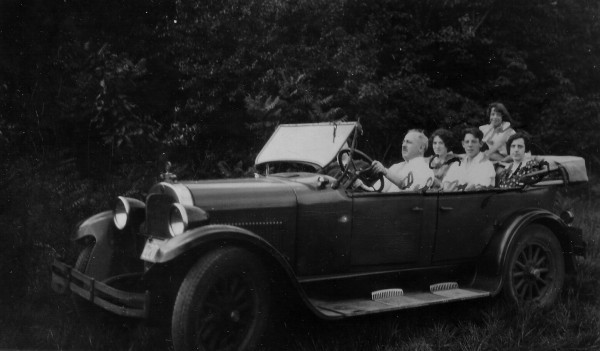
The Lagos family in
the "Valencia" - Antonio, Carmen, Manny, Jo, Vicky
Train service is horrible. Did we tell you we
bought a first-class "kilométrico" [train ticket with a maximum
number of kilometers]. The people that traveled in 3rd class on
the ship couldn't be nicer, but My God - on the trains of Spain!
We decided to travel less but better, and above all in better company,
so we got one of 4000 kilometers.
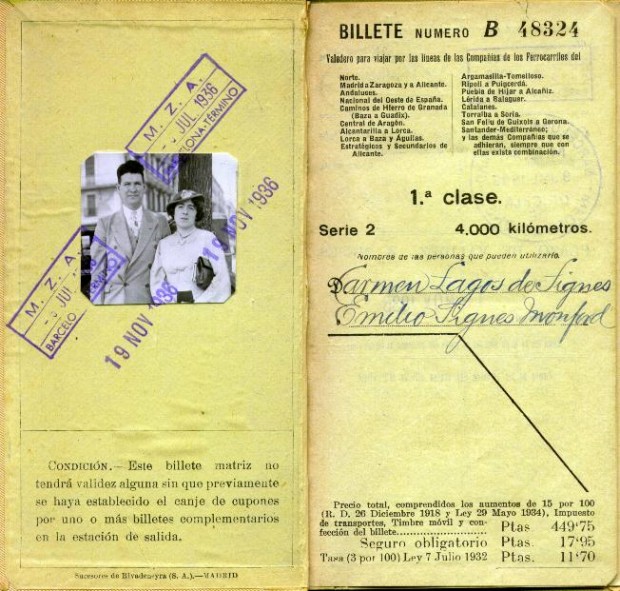
The little used ticket of 4000 km in first class
We had a lot of fun, but there's not a
day that we don't think of you and express our desire to see you
soon. It seems impossible that the time passes so quickly and so
slowly at the same time.
We've gone to see I don't
know how many of Papá's bancales
or pieces of land, I don't think we've seen half of them yet.
Almost all are planted with vines laden with grapes. Almost all
are still green, but yesterday Antonio came with a few
grapevine leaves in
which
he'd placed several ripe grapes that he'd found. In the
afternoon, Vicente, the older son of Anita (our sister), also brought
me some. Besides grapevines, Papa
has planted some pieces of land with olive
trees, almond
trees, carob trees, fig
trees, lemons and wheat. I've done many
things these days that I've never done before - I went in the wagon
holding the reins, I've climbed a carob tree, I've drawn
water from a well - in the end, lots of things.
Well, I will finally get to your errands and
soon I'll get back to writing you. If we
don't do
it every day you'll know it's because it's not always easy to do
it.
A thousand million thanks for what you
shouldn't have sent and receive millions of hugs from your children for
whom already the vacation seems long for not being able to see you.
Carmita and Emilio
[Emilio's writing]: Dearest Dad and Mommy
Although we're very busy we don't stop
thinking of you, all the time we're asking ourselves "What are they
doing? Are they talking about us? Do they miss us?
Tomorrow after mass we're all going to Javea
to spend a few days at the shore to swim and fish.
Thursday my brother Pascual gets married, and
we'll tell you all about it.
Don't worry about Carmita, she is very well
and she likes all this a lot. She's always busy, and she really
likes the Mediterranean Sea. Tomorrow, God willing, we're going
there for 2 or 3 [days], and Wednesday, we're thinking about going to
visit Alicante to see everything there. From here we're thinking
of going to Madrid for two or three weeks, and later we'll return and
pass some days here until mid-August to fix the luggage again, because
we're thinking of spending a few days in Barcelona and Paris before
embarking.
With nothing else to tell you, receive many
regards from our family and from your son who loves you very much.
Emilio
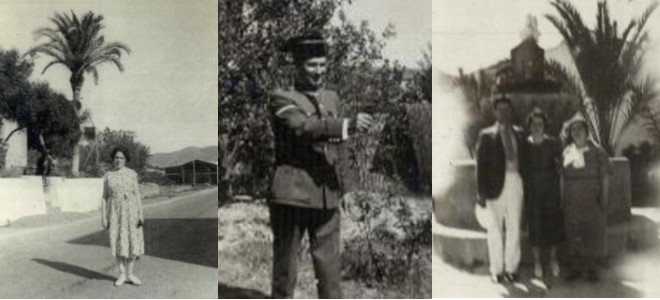
1.
Carmen in front of the Pou de Pedreguer; 2. Emilio in Pepe's Civil
Guard uniform; 3.
Emilio,
Carmen and cousin Anita
We feel that you are worried about the political happenings in Spain. Don't worry about us, because here everything is as calm as a millpond. They say that the government will manage to control the situation, because they think that this coup of the right had been planned for later, but that it was precipitated by the Machadista death of Calvo Sotelo. [On July 13 Calvo Sotelo was taken from his house by left-wing assassins and executed. Carmen used the word Machadista to refer to similar actions taken under the Cuban dictator Gerardo Machado.] I will tell you how we found out about the revolution:- We were seated at home, the two of us, the family of Anita, various cousins and some friends, when the mayor came and said:- "Ladies and gentlemen, kindly return, each of you, to your houses. In Melilla and Seville a revolution has broken out, so that all meetings are forbidden. Casinos and movie theatres are closed." We had thought to go for a few days to Pascual's chalet, so we decided to go to mass at 5:30 in order to leave early. But we couldn't go to mass because in the morning the person that pronounces the edicts announced:- "By order of the mayor all religious functions are categorically prohibited, and equally movie theatres and casinos will remain closed."
Around eight Antonio, Pepe, Trinidad, Pascual
and little Julian left the house in one wagon, and Anita (our sister),
Jaime (her husband), and her two sons (Vicente and Pedro), Pepe's son
Pepet, a cousin (Teresa), and we, in another. We met up with
Paco, Anita, and her father, tío Bernardo. We had a lot of
fun. We danced, had dinner, and later, music again. At 10
in the evening we went with the music to see some friends who have a
chalet a little further down the town. Monday Anita and her
family left in the morning, very, very early. So those that
remained were the family of Pepe, Pascual, and we. We all like
this very much. Our bedroom is one of the ones in front, so at
all hours we have a beautiful view. By day the Mediterranean is
precious, so blue, with the Cape San Antonio [Cabo
de San Antonio] on one side and Cape Nao [Cabo
de la Nao] on the other. By night the light of the
lighthouse of
the Cabo de San Antonio is lit up and is reflected in the water.
Later, little by little, pairs of boats leave to fish and
their lights form a garland of enormous stars. Last night,
after dinner we went to the Bar Estrella which is three houses from
here. Its very nice. In the front it has a very wide
platform for dancing. When they want, they can also bring tables
outside. I had almond and
tiger-nut horchata.
[horchata
= an almond and tiger-nut flavored milk]. We danced to the sound
of a crank organ. [?-pianillo
de esos de la
manivela]
We were thinking of going to Alicante tomorrow
and to Valencia for the fiesta which is at the end of this month, but
if things go the way they are, we won't leave here, because where one
is best off is in the little towns.
Wednesday, 22
July
Yesterday afternoon Antonio brought your
cable. We
returned immediately and when we arrived (as it takes 3 hours from
Javea to here), it was nine. We went to the telegraph office to
send you a cable but they told us that they closed at 7. We
returned this morning and they told us that they would expedite it as
quickly as possible, but that there was only one line open so they
couldn't guarantee when it would arrive.
We would willingly and gladly head for home,
but while this is so mixed up better to be here in the pueblo than
passing through big cities; besides surely they won't let us leave.
Yesterday we saw a warship pass very
swiftly. We have seen many ships pass and usually we could hardly
tell they were moving, but this one was going at tremendous speed.
Tomorrow Pascual gets married at 3 in the morning. We'll let you know how it all turns out.
Pray to Saint Jude that he fixes all this,
because we want to go to Madrid, and above all, we want to be able to
get home on time.
Keep writing. Since your 6 letters
arrived
at the same time we haven't had any mail. All together, we've
received 8 letters.
Tell Dee and Charlie that they're the only
ones
that still haven't written, and see if they can do so quickly.
Receive a thousand kisses and hugs from your
children that are anxious to see you,
Carmita and
Emilio
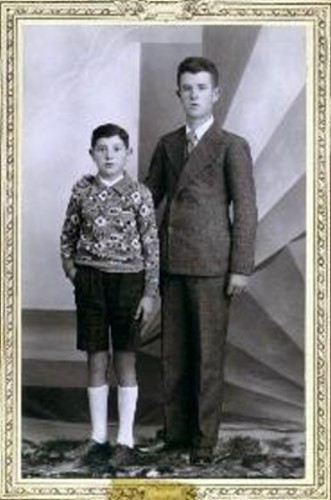
Pepe
and Vicente, sons of Emilio's sister Anita
This afternoon Pepe leaves. We all are
sad about it, because he's very good and very caring, and God only
knows in what trouble they're going to put him. [He was going to rejoin la Guardia
Civil, the Civil Guard.]
With regards to the revolution, you without
doubt know more than we. Here the only newspaper printed is a
single piece of paper and printed by the government, who says whatever
it feels
like. What we want is for all this to end so we can leave. Here
no one is very worried, they say that the revolution is a perennial
plant that sprouts every 5 or 6 months. If Spain continues like this, I
don't think we'll return. There [in the US] at least one can go
where one wants without danger of death.
One of these days we're going to spend a week
or two at the beach.
Don't worry about us, because here nothing is
happening. Receive a thousand kisses from your children who every
day miss you more.
Carmita and Emilio
Saturday 25
July
Dearest Mommy and Dad:-
Yesterday afternoon Emilio and I came here to
Javea, to Pascual's chalet. Rosa, Pascual, Emilio and I are here.
Gata's Church in 1998
With regards to the political situation we're
completely in the dark. In Gata
the only thing that circulates is an
official piece of paper in which one reads that the government is in
total control of the situation, nothing comes out of the radio except
patriotic discourses, Viva la Republica! and the "Himno de Riego" [the
national anthem of the Republic]
but there's a gentleman here that says that in the
house of a friend of his they hear news from Seville, and that it
says the complete opposite - that Spain is now in possession of the
"Liberating Army," as the followers of Fascism call
themselves. What we want is for all this to end so we can go to
Madrid. Today, the feast of Saint James, is when we were going to
go
to Valencia, to the fair and the bullfights. But until this is
fixed, we will stay either in Gata or here in Javea, because here
nothing is happening.
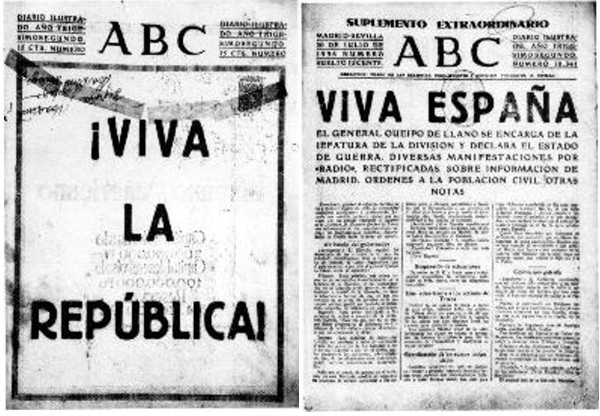
Two versions of the
newspaper ABC of 20 July
On the left is the Madrid (Republican) version and on the right that of
Seville (Franco's Rebel Version)
Rosa and Pascual send their
regards and ask us to tell you that their desire is that you were here
enjoying the happiness of the sea. That you should come another
year, because here you have "your house."
Please ask God to help us
arrange our departure because we really want to see the Statue of
Liberty and all of you.
A thousand kisses to all of
you.
Carmita and
Sunday 26 July
Dearest Dad and Mother:-
We
remain here in Javea enjoying the delights of the sea which don't
worry about human disputes.
A fragment of a document (Index of Marriages) recovered by Carmen and Emilio from the burning of the church in Javea
Today I've written a letter to the American
Consul in Valencia asking him to put us under his protection and to see
what we can do. We'll let you know what he says.
Pepe had to return to service on Friday. It's
needless to say that we are very worried for him, because God only
knows where they'll send him.
This week Paco and Anita came. I think
none of the rest came because they're disturbed by the burning of the
statues and they're not in the mood for enjoyment. [The next sentence was written in
English]: On the church there is a sign "For Rent."
Still we have no letters beyond the 8 original
ones. Surely you are also without news from us.
We haven't been able to send cards except a
few which we had of Valencia and Barcelona.
Write us via France to see if we receive any
letters.
Receive thousands of hugs for everyone from
your children that each day want more and more to see you.
Carmita and Emilio
[The following letter was
written to her 16-year old sister Josephine, in English. Undated.]
Jo
Jo, darling:-
How
are you? We
have come to spend a week or two with the newlyweds.
You would love it here! Our
bungalow is right by the ocean, or rather
the Mediterranean Sea:- on one end we see Cape San Antonio (I suppose
they’ll
be changing its name soon). On the
promontory there is a lighthouse. It
looks lovely at night as it turns shattering the darkness with its
powerful
beam.
Pray
a lot for us, for we can’t hear mass here. Mommy
will tell you all the mean things they
have done against our Lord.
Be
as good as usual, tell Charlie to give you a kiss from
us, and give yourself lots of love from your biggest sister and brother.
Carmen
and Emil
We're out of Spain! Tonight we will reach Paris, and we'll write from there. Thousands of hugs from your children,
Carmita and Emilio
Paris,
le 3 Aout, 1936
LE
PICARDY
23,
Bd des Batignolles (8e)
We got out of Spain!
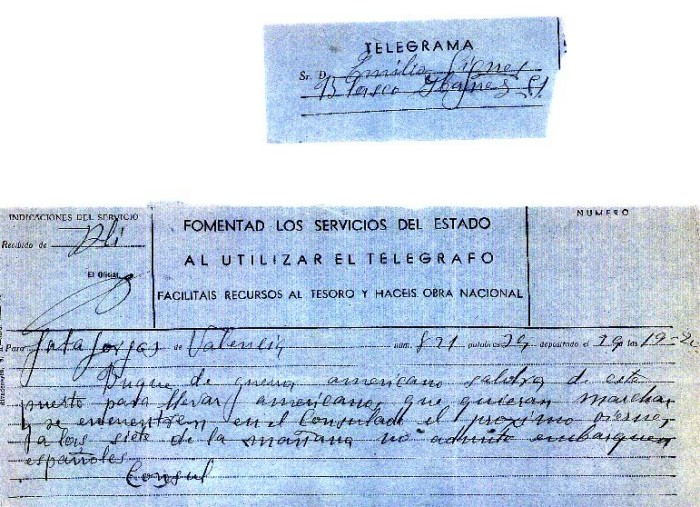
Telegram from the Consul
"American Warship will leave from this port to take Americans that want to leave;
they should be in the Consulate tomorrow at 7 AM.
Spaniards will not be allowed to embark
Consul"
Salvoconducto
[safe-conduct pass] necessary to go from Gata to Valencia
Imagine our situation. What were we going to do? The first train left Vergel at 5:50 in the morning, but wouldn't get to Valencia till 9, and the Consul had arranged the meeting at 7. We returned to Gata and Emilio went searching for a different driver that would take us to Valencia - no one wanted to dare take such a long trip - finally one said that for 75 pesetas he would take us. The voyage usually takes 2 hours and a half, but because in every town the militia stops everyone, and examines their car, luggage and everything, we decided to leave at 3 in the morning. So here we are, getting up at a quarter to 3, mamá already was up and had prepared our breakfast. We had breakfast and later, we waited and waited, 4 came and then 5, and the taxi still hadn't come. At 5 Emilio went to look for the taxi driver and he said he had fallen asleep! I don't know if it was that or if, at the last minute he became afraid. Because this is all very imposing. At the entrance of each town, there is a barricade, made perhaps of sandbags, or tree trunks, or rocks, and when they see a car 4 or 5 militiamen get on each side, with their rifles pointed and ready to fire. There are times when you're really afraid, and not just because you see yourself surrounded with loaded firearms, but the knowledge that a lot of the people carrying them have never handled firearms in their lives, and could very easily fire them without wanting to. We finally decided to go to Vergel to take the train. We didn't say goodbye to anyone, we said we were going to speak to the Consul, and within a few days we'd be back, but I think everyone knew that it was our farewell, except for Papá, and he almost knew it but he didn't want it to be. The poor man cried and said, "Tell the consul that in Gata you are fine, and then send a cable to your Papá and Mamá and come back. Carmencita has to eat a lot of ripe grapes and I want her to see ["escaldar la pasa" - this is part of a very old process in the making of raisins]. You will be back, won't you?" It was sad.
The train arrived in Valencia in the
morning at 9 and there we
found a Valencia that was completely paralyzed - the
shops all closed, taxis, buses, trolleys - none of them were
working. Fortunately in the station there were representatives of
all the foreign consulates, but the American representative had already
left. We
went up to a gentleman, and it was our salvation although we'll never
know what the help he gave us cost the poor man. It seems that in
Valencia there is a very big company that builds roads and
highways. The head of the company is a Mr. Warren of
Boston. Well, this gentleman with whom we spoke was en employee
of this company and he said that Mr. Warren had put all his employees
at the disposition of any foreigner that needed help. There are
times when one is proud to be an American! This gentleman was
Spanish, born in Cuba and spoke both English and Spanish perfectly; I
believe his last name was Casina. [Emilito's note - she wrote both Casina and Cansina
- I
have transcribed the name, in what follows, as she wrote it.]
He began by accompanying us to the American Consulate, and there, as I
had expected, the Consul very courteously said that they couldn't take
Emilio; if he were another nationality, yes, but being Spanish it would
be in violation of international law to take him. I thanked him, and I
told him that in that case I wouldn't go to Marseilles in the
warship. Señor Casina told us that he thought they
wouldn't let Emilio leave the country, but that he would take us to the
"Civil Government," but first we went to the station to put our luggage
in consignment, and right there our guide suggested that we have a cup
of coffee and something more, because later perhaps there wouldn't be
any food. We ate and drank and headed to "Gobernacion
[a government ministry],"
with these words of Señor Cansina, "Don't let yourself get
tired, señores, because we've got a long way to go." We
went walking, walking and chatting in English, but what a different
Valencia from the one he had seen on our previous visit! The cars,
which the government had seized to combat the revolution, had
flags that were either the tricolor, or red, and all had large
initials, F.A.I. (Federación Anarquica Ibérica, or
Anarchist Federation of Iberia) or U.G.T. (Unión General
de Trabajadores or General Workers Union), or others representing
leftist societies. Few people were to be seen on the streets,
only young boys with red shirts, or red ties or bands, and rifles on
their shoulder. We walked among them when one came up to us and
said to Señor Casina, "Show me your documentation." "I
don't have any documentation to show you. I'm accompanying these
people to Gobernacion.
You're the first that has stopped
me. My documentation is home." "I don't care if I'm the first or
not. I can see that these people are foreigners and they can go where
they like, I personally will find them a guide, but I know where you
come from, and because of that I insist on seeing your
documentation." Poor Señor Cansina
turned to us and said "As you
see, I can no longer walk with you. I'm so sorry. If you
have to spend the night here, come to see me at the Hotel Londres, and
I'll recommend you to the guest house where I live, because you'll pay
little and live well." We thanked him as well as we could and later two
militiamen took him away, and another accompanied us to Gobernación.
We never got to see our friend and good
guide again! We arrived at Gobernacion
and they told us that to leave
Valencia we would have to get a salvoconducto, but no one thought
that they would let Emilio leave. We got on line, a very long
line and we stood there for more than two hours. We thought that
if they didn't let us leave Spain, we would return to Gata. As
I'm telling you, it was a very long line, it seemed that we would never
reach the office. Now and again one of the militia would come by,
would "get on line" at the office, get in and come out right away with
a salvoconducto for a
friend. A poor old peasant who was in
front of us said, "They told us that we would all be equal, but now it
seems that the same thing is happening as before, whoever has
godparents gets baptized. The only difference is now other people
have them. But there are always some of us that don't get
baptized." When we got to the
office they said, yes, that having a passport they would let him
leave, but before they would give us the salvoconducto the passport
had to be stamped by another department, and we had to get the
signature of the governor. With a lot of joy and some fear in
case they were wrong, we went down to the Passport department, and in
fact, the two of us were allowed to leave! "You are lucky you
already have a passport, because now we can't make any new ones," they
told us. Once the passport was signed and sealed, we went
up for the salvoconducto.
Fortunately we didn't have to go from
society to society. They only put one stamp, from the "Frente Popular [Popular Front]"
authorizing us to go to France.
Salvoconducto to
leave for France
We left with the intention of going to the Hotel Londres to see what had happened to our guide, but, the truth, we were afraid. Each time there were fewer people on the streets; on the other hand cars were going everywhere. In several places they were raising barriers with sandbags, in fact it looked like Valencia was preparing for an invasion. We let Fear triumph over Gratitude, and went only to the French Consulate to get a visa for our passports, which they didn't do because the Consul said that in this abnormal situation it wouldn't be necessary. We went to the station where they told us that the first train to Barcelona left at 10:10 PM. It was only about 6, but we decided that the place were we were best off was at the station. We went to the small restaurant there, ordered the only thing they had - sandwiches - and waited patiently for the train to arrive. When the hour for our departure was approaching, I saw the American Consul who was waiting for someone, and, as I had seen subjects of other countries wearing bracelets with their country's colors, I asked him if there were any with any American insignia. He told me no then asked me what I was thinking of doing. When I told him that we were thinking of going from Barcelona to Cerbère, he said emphatically, “Well, my dear lady, you do so at your own risk. It is far better that you let us take you to Marseilles tomorrow.” [Many years later Carmen told her children that the Consul also said to her "We can't do anything for your husband. Furthermore, if anything should happen to him, we won't even be responsible for his body."]
I
thanked him but I told him that I didn't want to go alone and so we
went, he to look for Americans, I to look for Emilio in the restaurant. It would
have been 9:30 when suddenly we heard the sound
of many excited voices, and the sound of many feet marching, we stuck
out our heads and saw that a regiment of soldiers, followed by
very many
militiamen, were entering the station. They were carrying flags,
not only that of Spain, but various red ones. In a short time, we
also went to the track and we got into our train; the one on the next
track was full of the soldiers and militiamen we had seen. While we
were there, another regiment arrived, also of very young men.
Among them there was one with his mother hanging around his neck.
The poor woman was crying her eyes out; at a certain point she had to
separate herself from
him, and some of the young women that formed part of the crowd that was
gathered on the platform cheering on those that were leaving, said to
her:- "Don't cry, he's going to serve
the fatherland."
Even at night and in the darkness you could
see how the eyes of the poor mother shone. "And - you? - she
answered them with grief and contempt, "how many sons do you have
serving the
fatherland?" The young women went silent, and the mother kept
shrieking to the heavens, but
only God could hear her, because the station was filled with
indescribable excitement. Those that had gathered in front of the
train shouted with enthusiasm:
“¡Long
Live
the Republic!” shouted one, and together, making a deafening roar,
everyone answered
“¡Viva!”
“¡Long Live the Communist Party!”
“¡Viva!”
“¡Long Live
the Anarchist Federation!"
“¡Viva!”
“¡Death to Fascism!”
“¡Death!”
Poster celebrating the
CNT and FAI (anarchist organizations) fighting the Fascist revolution
At 8:33 in the morning, 18 minutes late, we arrived in Barcelona - at 8:40 the train left for Cerbère - with a speed that seems impossible we got out the ticket and got into another train. We arrived at Port Bou around one, we had to take everything out and we were subject to an extremely intense inspection. They looked at every little thing. When they started looking at a basket where she was bringing food, one woman exclaimed "My God, even the food!" To which one of the carabineros [soldiers armed with rifles] answered, " If you only knew - yesterday we found 16,000 pesetas hidden in a roast chicken." When they had finished inspecting the luggage, they put us in a room where they inspected us. Once they were convinced that we had no hidden money, they let us leave with what we had with us, even though it was more than the 500 pesetas that the law allowed. It was after 8 in the afternoon when the officials finished and we could get on the train, "destination France." We reached Cerbère shortly afterwards. In customs, they only made us open one suitcase, which they hardly looked at. The worst was that as they took so long to let us leave Port Bou, the train to Paris had to leave without us so there we were - exhausted and having to wait until the train arrived at 6:45. We entered the station and ate a wonderful dinner and at 6:45 got on the train. It wasn't a direct train, because that one didn't leave till the next day, so we had to transfer in Narbonne and in Toulouse we had to get off at 1:30 at night and wait for the train to Paris which left at 7:30. Finally, around 7 in the evening, we arrived in Paris and went directly to the Hotel Fournet - we bathed (which we were in need of), got dressed and went down to dinner, and from the table to bed. Imagine how on the one hand we were absolutely exhausted, and on the other hand, very contented that we had left the danger which traveling through Spain presented us, but also extraordinarily disappointed for many reasons - first, we had to leave the family in Gata prematurely, when we would have liked to spend much more time with them, secondly, It really angered me that I had been in Spain and hadn't got to see a single one of our uncles, aunts or cousins! We had other reasons to be unhappy:- we were left with more than half of our very expensive ticket intact, and we had a ton of pesetas which almost no one wanted, even as a gift. When we arrived each peseta was worth 2 francs, and now in the only place that would take them, they wouldn't give us more than 1/2 franc for each peseta. I don't have to tell you that we didn't change them, because one day or other they'll have to regain their value. [They never regained their value. Republican money wasn't worth anything at the end of the war, and many people fell into poverty.] The good thing is we still have Travelers Cheques!
The next day, that is to say, today, Monday,
after having passed an extremely tiring night, we had breakfast at the
same hotel and went to the steamship company to see if they could
change our passage to return on the 15th on the Bremen, but - no way! -
It's full and with many on the waiting list. Fortunately, there
was a compartment on the
Columbus which leaves on the 8th. We took it although there's no
doubt that it will be very inferior to that which we had on the Bremen
on the way over. But in the end, what were we to do? The
people at the company behaved like true gentlemen. It's a
pleasure to do business with people as serious as the Germans!
When we had finished our transaction with the
North German Lloyd, we went to travel around Paris. Every time
we like it more! We had lunch at an English restaurant which is
above an English bookstore where we bought a guide to Paris. In
the afternoon, while we walked around, we went into 2 churches - la
Madeleine and Saint Augustin - to give thanks to God for
how He had protected
us.
Later we returned to the hotel around 7, we
got dressed a went down for dinner. The hotel is full, because
it is housing 60 of the Canadians who came for the celebration in their
honor last week. All the employees are very affectionate: the
owner, although
he speaks perfect English, when I say something in English, tells me:-
“Je ne comprende pas,”
because he wants me to perfect my French. He treats us very
well. Last night, at dinner, he gave me two very large and very
pretty dahlias. I took them up and put them in the vase which is
in our room's fireplace.
So here you have us, in bed, finishing this
letter which is almost a book of many volumes.
A thousand kisses and hugs to all, and tell
Manny we'll be glad to be able to spend his birthday [August 15] with
him.
x x x
millions (I learned this
o o o millions
from Jo)
from
Carmita and
Emilio
______________________________________________________________________________
Ozean-Brief
/ Ocean Letter / Carta de alta mar / Von D. Columbus
10 august 1936
we arrive saturday 15 in the morning on board
the columbus
we are very well
carmen
emilio
______________________________________________________________________________
Appendix
The Gata
relatives.
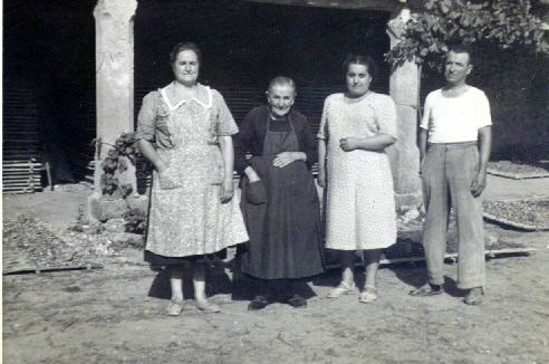
Josefa
MONFORT DIEGO (1867-1953), Emilio's mother, en 1950.
The others are, from left to right, Trini QUEROL (Pepe's wife),
and Rosa
PEDRÓS y Pascual SIGNES (the two who were married on July 23,
1936)
My
father's brothers. Pepe spent many
years in jail, first in a Communist jail, later one of Franco's, as a
consequence of an experience in the Civil Guard during the War (a Civil
War column, en route from Morella to Teruel, was taken over by some
Franco supporters who murdered its leaders and many
young volunteers of the left. Pepe fled. First the Reds
jailed him for being part of that rebel column; later Franco's
government jailed him for desertion). Click
here for a brief description of Pepe's travails. Anita died
in 1957.
My fathers got to see his other three siblings, Pepe, Pascual and
Antonio, in 1965, after attending my wedding in Germany in 1965.
Anita
and Paco. They are major characters in the
story of the Gata visit; I'm pretty sure they are Anita SIGNES
BORONAT, my father's first cousin, daughter of my grandfather's brother
Bernardo SIGNES GARCÍA, and her husband
Francisco SALVADOR
GILABERT. I don't have any more information about
them, other than that they had no children.
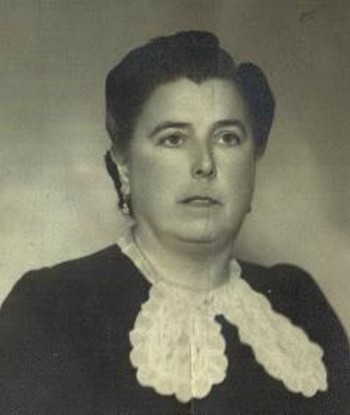
Anita SIGNES BORONAT
The
Madrid relatives.
Relatives
of my grandmother: BESTEIRO. We know that
they were going to visit Emilio and Jorge BESTEIRO GRACCIANI,
brothers of Carmen's mother. There is a letter from Emilio
Besteiro
to my parents on 11 July that says "I don't have to tell you how happy
we are that we will be able to hug you in person." My grandmother
wrote to my mother, "How lucky you are that you will be able to hug my
two so very dear brothers!"
Had
they traveled one month earlier they would have seen them both - and
everyone else on their list - and gotten out before July 18th.
Funny how things
work. . . .
Emilio
BESTEIRO was taken out of his house late on the evening of August 9th
(or more likely the wee small hours of the 10th) by a group of unknown
people (a common practice in the
beginning of the war) and found the next day, at "kilometer 10 of the
road to Andalucia," assassinated for still-unknown reasons (also
a
common occurrence).
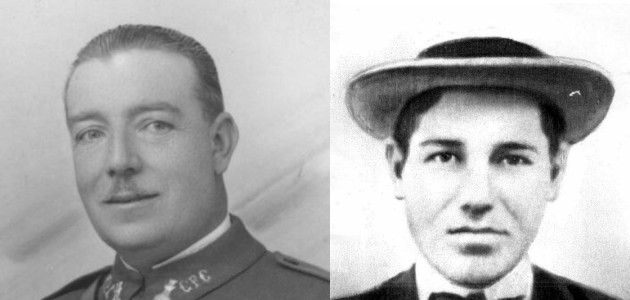
1.
Emilio BESTEIRO (1886-1936) in 1935. 2. A
young Jorge
BESTEIRO (1889-1936); perhaps in 1912
Emilio was shot and killed ("executed") by unknown assailants on August
10, 1936.
A mass card for Emilio (surely after the war):
"vilely assassinated by the red horde"
Jorge
BESTEIRO died of cancer on September 2, 1936 in Santa Olalla (Toledo).
His family had to flee the town precisely during his burial, as
Franco's troops were entering, and they were politically
compromised.
My parents probably wanted to visit my
mother's granduncle, Julián BESTEIRO
FERNÁNDEZ, one of the leaders of the Republic (he had been the
leading vote-getter in the February 1936 parliamentary
elections).
Julián was imprisoned after the war and died of untended blood
poisoning in one of
Franco's prisons in 1940. Another grandaunt, Carmen
BESTEIRO
FERNÁNDEZ, Julián's sister was still alive at the
time. I believe she lived in Carpio de Tajo, Toledo at the time,
but I'm not sure.
Julián
BESTEIRO FERNÁNDEZ (1870-1940)
I
don't know if another sister, María, was still alive, but I do
know that María's daughter, Beatriz
LÓPEZ-OCAÑA
BESTEIRO, a very good friend of my grandmother's, was alive, as was her
daughter Beatriz
LÓPEZ-OCAÑA LÓPEZ-OCAÑA,
who was about the same age as my mother. Granddaughter Beatriz is
still alive and lives in Madrid (1998). [2005: María was in fact alive
in 1936; she died in 1938 or 1939 of cancer. I - Emilito - found
this out from her daughter Beatriz LÓPEZ-OCAÑA LÓPEZ-OCAÑA in
1999. This latter Beatriz died
in Madrid in
2001 at 92, shortly before my scheduled visit to interview her.]
Beatriz LÓPEZ-OCAÑA BESTEIRO (1881-1938 or 39)
Relatives
of my grandfather: LAGOS. Only one of my
grandfather's uncles and aunts was still alive in 1936, and he lived in
Madrid - Adolfo LAGOS
MUÑOZ. It is certain, from a note my grandmother sent to
my
mother, that they were going to visit him and his wife Margarita.
Adolfo died in 1950.
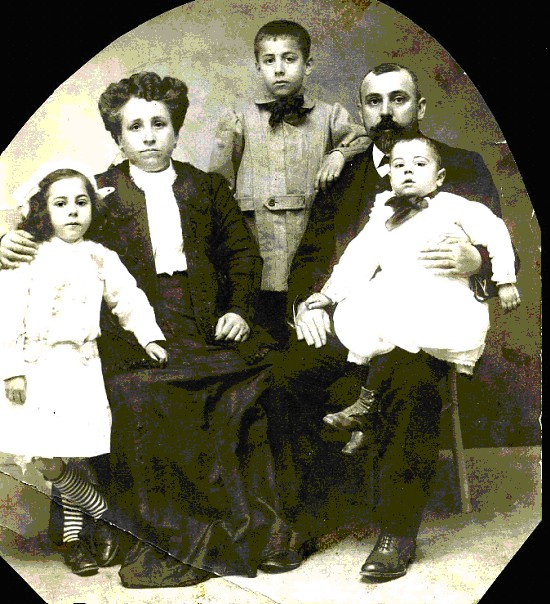
Adolfo LAGOS MUÑOZ (1871-1950) and family c. 1909
The War changed all of Spain and its
citizens. Within the right-wing Lagos family,
Adolfo LAGOS ESCALONA (the baby in the picture above and
the son of Adolfo LAGOS MUÑOZ, became a communist commissar during the war and
had to flee to the Soviet Union after the war. He didn't return
until 1976, the year after Franco died.
-
Adolfo
LAGOS ESCALONA (1907-1980), commissar, in 1938
It is likely that they were going to visit
several of my grandfather Lagos's cousins in Madrid. Among them
were Cristina and Manuel LAGOS LLORENTE, and
Mariana and Manolita LAGOS PONCE DE LEON; among them they had more than
15 children. We know that my grandfather
Antonio was in contact with Paco NÚÑEZ MORENO,
another cousin and husband of Cristina, during that time period; he had
called Paco trying to find Carmen and Emilio during the July crisis.
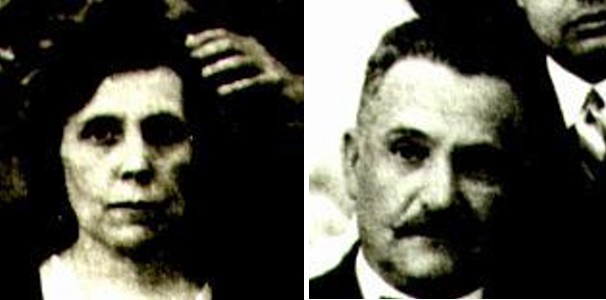
Cristina
LAGOS LLORENTE (1879-1943) and her husband Paco NUÑEZ MORENO
(1877-1952)
Gata
de Gorgos. Gata de Gorgos was lucky
during the war; there were no battles in town nor was anyone executed
on account of the war for political revenge.
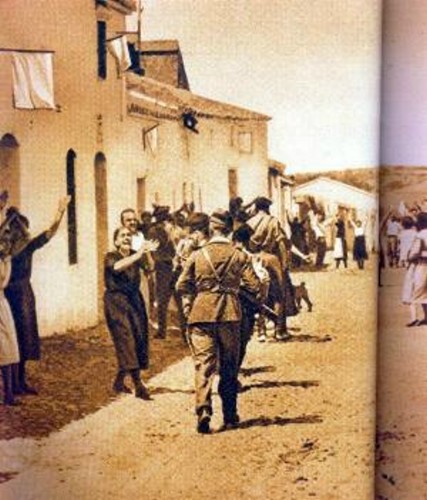
Gata was lucky. Here is an Andalusian town occupied by the rebels
in August 1936.
Tuesday, 28 July 1936
o While in Javea, they receive a
telegram from the American Consul in Valencia asking them how they are.
Wednesday,
29 July 1936
o While in Javea, they
receive a telegram from Emilio Besteiro in Madrid, asking them to
telegraph their parents in Paterson
o The telegraph the
American Consul asking him to advise them as to what to do
Thursday, 30 July 1936:
1300 In
Javea, they receive a telegram from the American Consul in
Valencia. He advises Carmen that an American warship will leave
the next morning. She will have to be in Valencia at 7 AM.
"Spaniards will not be allowed to embark."
o They walk 2 miles to call
Valencia; when they arrive at the phone, they are told that the lines
have been cut.
o They take a taxi to
Gata; the taxi gets a flat tire. The wait 2 hours and finally finish
the
trip on foot.
1600 They arrive in Gata too late to get the train
to Valencia.
o Emilio gets a salvoconducto, stamped by the 6
representatives of the Popular
Front, good to Valencia.
o they get a taxi to
Vergel
1803 the taxi gets to Vergel 3 minutes too
late for the 6 PM train. They can't follow it, because the taxi
driver only has a safe-conduct pass as far as Vergel.
o The get a driver to
agree to take them to Valencia at 3 AM.
Friday,
31 July 1936
0245 They get up.
0500 Emilio wakes up the taxi driver, who
has slept in. They decide to leave for Vergel.
0550 They leave Vergel for Valencia.
0900 They arrive in Valencia, the American Consul
has left the station.
o They go to the American
Consulate; they won't help Emilio.
o They return to the
station to put the luggage in consignment.
o They go to the
government building.
o They get in a line where they
remain for more than 2 hours.
o They will allow Emilio to leave,
but it is necessary for him to get his passport stamped in another
department.
o They get safe-conduct
passes for both.
1800 They arrive at the train station.
2210 They leave Valencia for Barcelona..
Saturday,
1 August 1936
0833 They arrive in Barcelona.
0840 They leave Barcelona for
Cerbère.
1300 They arrive in Port Bou; they undergo
an intense examination
1500 They are allowed to board a train,
"destination France."
1845 They leave Cerbère for
Paris.
Sunday,
2 August 1936
0130 They arrive in Toulouse.
0700 They leave Toulouse.
1900 They arrive in Paris.
Monday
3 August 1936
Carmen writes a long letter to her parents.
As a result of
their experiences in Spain at its start, the Spanish Civil War was
always imprinted on Emilio & Carmen's memories. Emilito and
his
siblings will always remember an ancient 78 rpm record with
two songs about the Spanish Civil War. Especially notable was a
song called "¡No pasarán!" Click here to read more.
Need to scan:
Bar Pou today
Emilio Besteiro telegram
All the letters from Maina to Carmen
Telegram from Consul
Alien note
Hinchliffe, etc – entire history in telegrams . . .
Think of more
Include front pages of newspaper,
Esta página en español
Resum en valencià